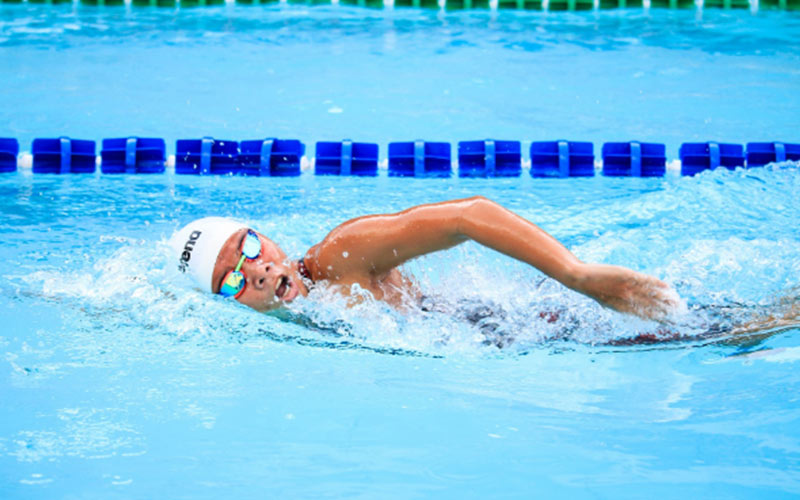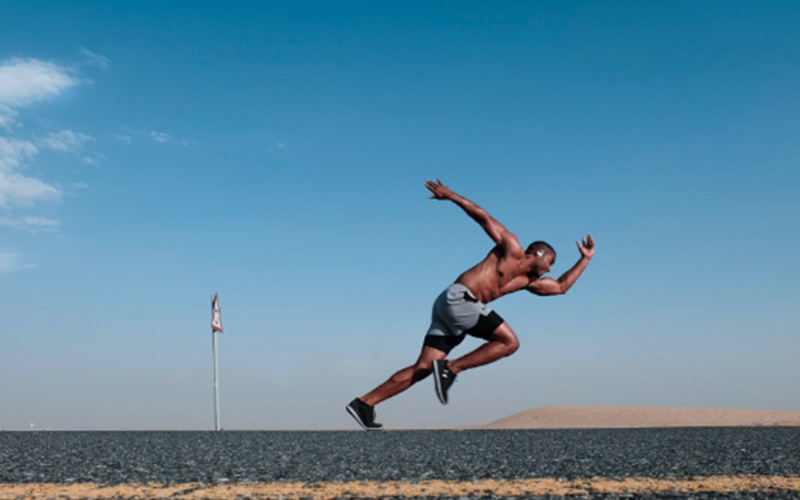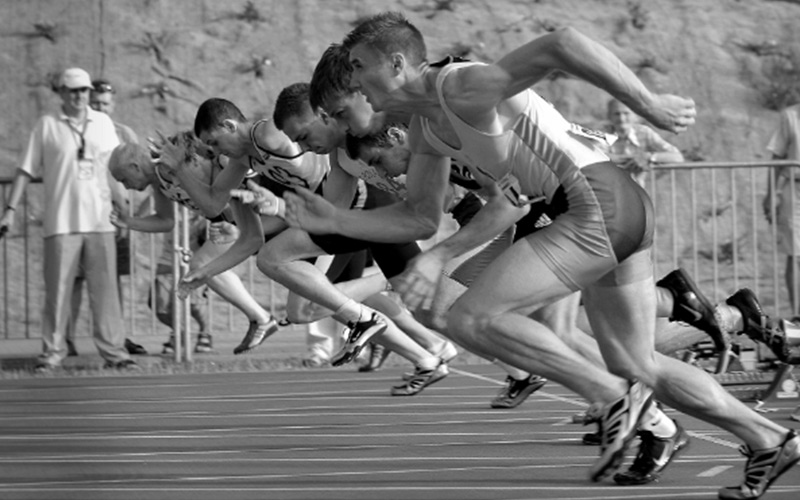Sports Science
What kind of degree is this and what career opportunities does it offer?
What is Sports Science:

Being a relatively young discipline, gaining popularity in the last quarter of the 20th century, sports science reflects the seriousness with which sports and fitness are approached today. This is a relatively multidisciplinary subject, drawing on fields such as physiology and biomechanics to measure what is happening in a sportsperson’s body; psychology to analyze the role of the mind in performance; nutrition to help athletes fuel their bodies correctly; and business and sports management to understand the financial and operational sides of the sports industry
Sports science, is a combination of several different disciplines which focuses primarily on the scientific principles behind exercise performance. It studies the relevant branches of science, including physiology, psychology, biomechanics and nutrition focusing on how these various elements work together to improve physical performance. These skills are combined with business and management skills to produce graduates who are capable of careers in a range of industries.
The main focus of sport science is to understand the relationship between exercise and human body, from a cellular level all the way through to the impact on the body as a whole. Most sports science graduates find themselves in the sports performance industry, as the competition to achieve new records in different sporting disciplines continues to intensify.
In recent years, sports science has rapidly become a very popular course and recent research into the human body’s reaction to exercise and other impetuses is changing the way that athletes train and condition themselves.
What will be covered in a sports science course:

A sports science course introduces students to the various elements of science that explain the relationship between exercise and the human body. Over the course of the degree students will develop an understanding of the following:
Physiology – the branch of biology that deals with the normal functions of living organisms and their parts.
Psychology – the scientific study of the human mind and its functions, especially those affecting behaviour in a given context.
Neurophysiology – understanding the nervous system and how it functions.
Biomechanics – the study of how the skeletal and musculature systems work under different conditions.
Biochemistry – the branch of science concerned with the chemical and physico-chemical processes and substances which occur within living organisms.
Psychophysiology – the way in which the mind and body interact.
Anatomy – is the identification and description of the structures of living things. It is a branch of biology and medicine.
Bio kinetics – provides natural, drugless, nonsurgical health treatments and rehabilitation, and relies on the body’s inherent recuperative abilities.
Muscle mechanics – Two types of muscle contractions are recognized and defined by whether a muscle shortens when contracted.
Immunology – The study of the immune system which is a very important branch of the medical and biological sciences. The immune system protects us from infection through various lines of defense. If the immune system is not functioning as it should, it can result in disease and reduced performance levels.
By being exposed to these various disciplines sports science students will have a wide foundation of knowledge to help them decide which career path would be best suited for them.
What are the entry requirements to be accepted onto a sports science course:
As for all subjects, entry requirements will vary depending on the institution. Typically, applicants will be expected to show strong aptitude in the sciences, particularly areas such as human biology and psychology, and of course a keen interest in sport is essential. The most popular sports science courses can be fairly competitive, and not all universities cover this subject, so you may need to look beyond the most familiar names to find a course that’s right for you.
Most sports science courses require interested students to have studied at least one science-based subject in secondary education. Biology is arguably the most valuable subject, while physical education, chemistry and physics are all useful and would give a future sports science student a good foundation.
The careers that a sports science degree can lead to are very broad, however if a prospective student is already sure of their intended career path then they may find some subjects more useful than others – for example, a prospective sports psychologists should consider studying psychology at school, while someone hoping to become a dietitian or nutritionist may consider studying food technology. Someone wanting to be a sports coach might consider physical education as a good foundation.
Having a keen interest in sport and exercise is vital and there are so many opportunities to get some work experience in a related field before starting a sports science course, such as helping at a sports club, outdoor pursuits activities, or even working at a gym.
Course Structure:
Sport science degrees usually last for three or four years at undergraduate (bachelor’s) level and one or two years at master’s level. Teaching will typically be conducted via lectures and seminars, but you can also expect laboratory sessions (when studying exercise physiology and biomechanics); practical sessions (in gyms, sports halls, fitness rooms, swimming pools, courts and on sport fields); and independent research and study. Students are expected to develop theoretical knowledge alongside applied practical skills. Assessment is based on coursework; written, oral or practical exams; and laboratory reports. Towards the end of the course, you may be required to write a dissertation and/or conduct a piece of independent research.
Best universities to study sports science:
According to CEO World magazing the top 10 universities to study sports science in 2018 are:
- School of Exercise and Nutrition Sciences, Deakin University Australia
- Norwegian School of Sport Sciences Norway
- School of Human Movement and Nutrition Sciences, The University of Queensland Australia
- University of South Carolina – Columbia United States
- School of Sport, Exercise and Health Sciences, Loughborough University United Kingdom
- Department of Sports Science and Clinical Biomechanics, University of Southern Denmark Denmark
- German Sport University Cologne Germany
- School of Sport, Exercise and Rehabilitation Sciences, University of Birmingham United Kingdom
- University of Illinois at Urbana-Champaign United States
- Faculty of Kinesiology and Rehabilitation Sciences, KU Leuven Belgium
General Methodology on the CEO WORLD magazine’s World’s Best Universities For Sport Science In 2018. The rankings are based on seven major metrics of quality and reputation. Overall Score (100%) is the sum of:
- Perceived Global Brands Influence (20%)
- Recruiters Responses (20%)
- Employers Feedback (10%)
- Job Placement Rate (10%)
- Admission Eligibility (10%)
- Specialization (10%)
- Academic Reputation (20%)
To establish our list, we collected information and statistics from publicly available sources, research, and survey. The ranking measures the quality of education, job placements of graduates, recruiters response, employers feedback, without relying on institutions data submissions.
Graduates, industry professionals, employers, and recruiters were asked to rate universities on a scale of 1 “marginal” to 100 “outstanding” or “don’t know.”
https://ceoworld.biz/2018/01/11/worlds-best-universities-for-sports-science-in-2018/
According to the Gaurdian the top 10 universities offering Sports Science course in 2018 were:
- Loughborough University United Kingdom
- The University of Sydney Australia
- The University of Queensland (UQ) Australia
- University of British Columbia Canada
- University of Birmingham United Kingdom
- University of Toronto Canada
- University of Alberta Canada
- Pennsylvania State University United States
- Massachusetts Institute of Technology (MIT) United States
- Seoul National University (SNU) South Korea
Methodology was based upon:
Academic reputation, Employer reputation, Citations, Research impact
What career opportunities exists:

As the sports and health industries continue to expand, sports science has rapidly become a very popular degree course and it can be used in a variety of different industries, making it a versatile choice of degree. Sports management is a common destination for graduates and makes use of the business and management skills learned on the course, often in positions within sports clubs and organizations.
Sport psychology and physiotherapy often require additional qualifications, but roles within these fields are also popular choices for sports science graduates. For those interested in teaching, sports education may be a good choice of career path and there are more and more roles available, from teaching children in a school environment to instructing clients as a personal trainer.
In today’s health-conscious world, sports nutritionists also have a vital role to play in keeping sportspeople and athletes in peak condition, and this is another likely career path for sports science graduates. A lot of graduates go into careers as PE teachers, sports coaches, fitness instructors and personal trainers, although the management, organizational and motivational skills that are central to most sports science courses allow sports science graduates to adapt to numerous roles.
Graduates who choose to continue their education and training beyond undergraduate level can specialize and become nutritionists, physiotherapists, sports psychologists and research scientists, as well as a host of other roles.
Sport Science graduates are extremely versatile and able to build careers in a wide range of industries. Sport Science degrees combine the study of a range of scientific branches, including nutrition, physiology and psychology, with the study of exercise performance to enable students to have significant insight into the scientific principles which affect sport performance. This is often combined with modules focusing on business and management studies, which develop skills that are advantageous in the job market.
The most common paths for sport science graduates are:
- Sport performance
- Management
- Education
- Graduate Schemes
- Further Study
Some of these fields will be directly related to the knowledge gained from a sport science degree, whereas others will require further training, or utilize the skills developed during the degree. We have broken down each of these fields, looking at the kind of jobs available in each sector and the skills required.
Sports Performance

Around a third of sports science graduates go on to work in the sports industry. This is a field that will make significant use of the insight into exercise performance gained through a sport science degree. Working at a high level in this industry is extremely competitive – especially as there is consistent pressure on athletes to break established world records, and they need all the insight they can gain.
Job roles: Personal trainer, professional coach, sports nutritionist, fitness instructor
Requirements: leadership, communication, ability to inspire, high fitness level, working with people
Positives: This kind of work is often highly flexible, with opportunities to be self-employed or teach/coach in a range of venues. There is a lot of opportunity to specialise in what interests you – whether that is a particular sport or working with particular kinds of people
Drawbacks: Demand can vary and the work is sometimes unreliable. It can be very physically demanding, and you will probably need to work non-standard hours.
Management
Management, particularly sports management, is also a very popular career for sport science graduates. The management and business modules required by most courses provide graduates with an insight into finance, business strategy and management which is invaluable in a management role, whether it is in a sports club or organisation or in a totally different industry.
Job roles: Event manager, outdoor activities manager, sports centre management, project manager
Requirements: Analytical skills, communication, data handling, numeracy, problem solving, time management
Positives: Honing these skills will make you highly employable in a range of industries. Management offers great opportunities for career advancement and salary increases. This career involves a high level of responsibility and challenging work that is varied and draws on a wide range of skills.
Drawbacks: Depending on which industry you work in, you might not have much chance to utilize the knowledge you developed during your sport science degree. This career can be high pressure and involve making tough decisions.
Education
Sports science graduates also have the opportunity to work in education. In order to become a qualified teacher in the UK you need to complete a post graduate teaching qualification, typically a PGCE. We have chosen to separate education and further studies because this is typically a vocational qualification with a heavy emphasis on learning to teach, rather than studying. Depending on the A Levels you studied and the academic element of your course, you might be qualified to teach science or maths, as well as PE, though you might have to complete a Subject Knowledge Enhancement course prior.
Job roles: Primary Teacher, Secondary Teacher, Leadership, Lecturer
Requirements: Numeracy and literacy skills, communication, interest in working with young people, problem solving skills
Positives: Teachers make a big difference to the lives of young people. Education also has good opportunities for advancement and salary increases. It is varied and challenging, and has good holidays!
Drawbacks: The role can be challenging and you need to be able to manage pupil behaviour. The long holidays are a benefit, but it means that you don’t have any flexibility with your time off. The role also requires additional work outside of school hours – including planning, marking and parents’ evenings.
Graduate Schemes
This might sound like a very generic path, but the truth of the matter is that many graduate roles in big international companies only require a degree – they don’t specify what subject the degree needs to be in. This is because they invest in recruits and provide significant on the job training. This enables you to utilize a sport science degree as a springboard into a huge range of industries, including financial services, HR, banking, IT and management consultancy.
Job roles: Various
Requirements: All of the skills you have developed during your degree including problem solving, numeracy, analytical thinking, communication and leadership.
Positives: Working for a large company can come with benefits such as car schemes, a great pension and excellent salary progression. They are also a great name to have on your CV, which may open up doors in the future. There are a huge range of opportunities, which allows you the chance to find something that interests you.
Drawbacks: Job security is variable between companies – if there is a financial challenge, graduate recruits are sometimes the first people who are let go. Recruitment is highly competitive and your pay is likely to be linked to your performance, so it can be a very pressured environment.
Further Study
There are a large number of careers related to sports science that require an additional qualification. Typically, these will build on the knowledge developed during a sport science degree and may also provide professional certification. If you’re looking to specialise and work in a field such as therapy or psychology you will usually require a second degree or post graduate qualification. This path will definitely build on everything you have learned during your degree, and allow you to access highly paid professional careers.
Job roles: Physiotherapist, psychologist, journalist, solicitor
Requirements: Commitment to further study, written and oral communication, good grades, self-motivation
Positives: Further study could allow you to deepen your knowledge of particular areas of sport science and continue to develop key employability skills. There are a huge range of options for further study, including new fields such as law and journalism. A post graduate degree may also result in a higher starting wage and greater opportunities for career development.
Drawbacks: At the end of a degree many graduates are ready to enter the workplace and aren’t keen to commit to further study. Depending on the course you choose, you could be in education for a further 4 years or more. It can also be challenging to fund further study, depending on the course you choose.
https://www.mendeley.com/careers/article/what-can-you-do-with-a-sports-science-degree-/ – management
Famous people who studied sports science
Sports science is now offered by a host of universities, primarily in the UK and the United States, and it has become increasingly popular in the last few years. Among the famous people who have studied sports science are British Paralympic athlete John McFall, who received a bachelor’s degree from Swansea University and later completed a master’s course at the University of Wales Institute, Cardiff (UWIC).
Interestingly the son of the British Princess Royal, Peter Phillips, also studied sports science, later going on to work for the Williams Formula 1 racing team. Tim Noakes, a South African scientist who is among the most respected sports scientists alive today, studied at the University of Cape Town and has written a number of books about diets and exercise.
https://www.timeshighereducation.com/student/subjects/what-can-you-do-sports-science-degree – survey-answer

